- Home
- Martin Archer
Sea Warriors
Sea Warriors Read online
Publisher’s note: Welcome to another of the fast-moving novels in the English family saga based on the parchments found in an old trunk buried under the rubble in the basement of the Bodelian Library. It is the action-packed story of life and warfare in medieval England as the Cornwall-based captain of an independent company of English archers and others told it to the monks of Bodmin Monastery.
This is another of Martin Archer’s exciting stories about the English serf who rose to become the captain of what was left of a company of crusading English archers—and what happened to him and his family after he led the survivors of his company back to England. The first book in this saga is entitled The Archers.
Preface
Taking a train full of currency or capturing a Spanish treasure ship is nothing compared to the greatest theft in history—when an English archer and his men stole the entire treasury and religious relics of the world’s greatest and richest empire and got away to Cornwall with chests and chests of gold coins and priceless relics. This begins the story of what happened when he tried to turn the relics into coins for himself and his men.
Sea Warriors
Chapter One
We reach London with our French prizes.
We saw the French prizes from our expedition to Harfleur anchored everywhere as we rowed up the Thames on our way to where we usually moor in one of the berths along the long quay. The French transports we had taken were waiting to be towed further up the river so they could anchor closer to the quay and our dilapidated-appearing London post. It had been a derelict draper’s shop near the quay before we bought it and began to fix it up to meet our needs—and perfect for us because it made us look poor and not worth hounding to pay taxes to the King or protection money to the local neighbourhood association.
Not that we’d pay the local association for their protection, mind you. If the neighbourhood hard men in the tavern down the lane were foolish enough to come to us demanding coins, we’d kill them and their leader knew it. King John was another matter. He was above it all, which was another way of saying he really didn’t have any idea of what might happen if he tried to interfere with us. Neither did we; so we treated him like a sleeping dog and tried not to wake him.
******
Spirits were sky high and the rowing drum beat steadily as we moved up the Thames under the grey sky with hordes of gulls wheeling and swooping overhead. We were cheered and waved at by prize crew after prize crew as we rowed past our French prizes where they waited at anchor for their tows to arrive. Harold’s galley was well known and the men all knew that the captain of the Company of Archers, that would be me, and one of my lieutenants, the sergeant major of all our ships, that would be Harold, were on board. So was my son George, newly promoted and proudly wearing the four stripes of a sergeant captain.
George was quite chipper for someone who had almost lost his life a few hours earlier. It’s often like that for fighting men—there is nothing more exciting than having a sword stroke or arrow loosed at you to no effect, or, in George’s case, all of the above and riding a falling mast into the water in the midst of a sea battle and being able to swim free.
“We’ll have no trouble recruiting sailor men and pilots after they hear about the prize money that will come of this,” Harold remarked cheerfully as we rowed past another cheering prize crew. “Though that’s rarely been a problem.”
“Hopefully, it will also help us recruit more strong young lads to apprentice with us as archers,” was my reply. “And clerics to do our scribing and summing, although we won’t be so desperate to find them now that more and more of Thomas’s students are beginning to come of age. Priests are such trouble, especially those who are willing to make their marks on the company’s articles.”
A moment later I realised what I’d said when Harold smiled benignly. I hastily added, “My brother and my son and Thomas’s students being exceptions, of course.” And me too.
Truer words were never spoken; Thomas may be a priest, but he’s a good archer and he bought his bishopric and his mitre and crozier fair and square with some of the coins we got from the refugees for carrying them to safety from the Saracens. He even paid both the King and the Pope to be sure his appointment would be good no matter what the outcome of their argument about who should name England’s bishops and collect their bribes; yes, he did.
My son George and I and all the other apprentice-sergeants from Thomas’s school are, of course, priests by virtue of having been learnt to read and jabber Latin and being prayed at by Thomas.
******
The excitement and anticipation of our prize crews was certainly no surprise; the men all knew they’d soon each be receiving a goodly amount of prize money. And they were entitled to every coin of it—we’d surprised the French at Harfleur and come away with much of the great armada of transport cogs and ships King Phillip had assembled to carry his army to England. It had been a splendid taking and my lieutenants and I wanted to make it a highly profitable one. That’s why we’d brought our prizes to London, so potential buyers would be able to inspect them and buy them.
Most of the prizes we passed as we rowed toward the quay were single-masted and double-masted cogs, but there were a few of the new, bigger and longer, three-masted ships Harold and our port sergeants say are gaining favour with the sailor men because they can carry so much more cargo. The three-masters also, so it is said, make faster passages because they carry more sails.
******
It was only a few hours after sunrise but the scene on the quay was already gay and festive as we rowed up to it. The sky may have been murky and looking like rain, but the quay was crowded with people and our galleys were two and three deep at every berth along it.
We had no trouble mooring when we reached the quay because a berth had been kept open for us. Of course, it had been kept open; Yoram and my brother Thomas and a large force of our archers had ridden to London all the way from Cornwall so as to be here to meet us after we finished raiding Harfleur.
And I’d wager Yoram and Thomas’s arses are sore and blistered from riding so far so fast; they never were much for being riders, were they? Just like me.
We had a berth at the quay waiting for us because, as soon as Yoram and Thomas arrived, they had taken up all the other berths along the quay in addition to the two berths we bought years ago for our own use.
Yoram, of course, was my lieutenant in charge of the most important of all our trading posts, the fortified citadel we had built, and were still strengthening, on Cyprus near the Limassol city wall. He had come to England when I sent the recall notice to my sergeant captains to bring in their galleys and archers in for a big raid. I hadn’t told Yoram or anyone else where we’d be raiding, just that it would be a big one.
Most of the men had arrived thinking my lieutenants and I would be leading them against the Moorish shipping at Algiers. That was what I wanted everyone to believe. In fact, I led them against the armada of French transports being assembled in Harfleur, the armada of transports Phillip of France had intended to use to carry a French army to invade England in support of the barons opposed to King John.
However sore his arse might be, I was greatly pleased that Yoram came all the way from Cyprus to participate—he was my first recruit after I became captain of the company and, although I’d never say it in front of the others, the best recruit who ever made his mark on our company’s articles. That was right after the eighteen of us, nineteen if you include George who was just a little tyke at the time, went over the wall at Edmund’s crusader castle in Bekka Valley after Thomas said a nice prayer and I gave poor Edmund a mercy from his horrible wound.
And why did we come to London with our French prizes instead of returning to our home base in Cor
nwall? Because London was then, as it still is to this day, in the reign of King John, full of merchants and moneylenders and idle second sons looking for something to keep them busy and earn their bread without working too hard or having to join the Church and mumble prayers all day.
All those people together in one place made London the best place in England to sell whatever of our French prizes we decided not to keep for our own use. That’s why we were assembling them in the Thames in front of the city.
Besides, if our French prizes didn’t fetch high enough prices here in London we’d take them elsewhere to sell or sail them to the Holy Land to use in our own cargo-carrying and passenger-carrying operations. Alternately, of course, we would use them as pirate-takers by concealing a large number of fighting men in their castles and cargo holds and releasing them after the pirates grapple us and come aboard. We’ve come by many of our galleys that way, we certainly have.
******
The rowing drum slowed as we approached the quay where we normally berth our galleys and cogs when they come to London. We could see that it was packed with people. Many of them were men from our galleys tied up along the quay and from the dinghies of the prize captains who had rowed in to report where their prizes were anchored and arrange for towing. Our men were easy to pick out amongst the crowd because they were each wearing one of our simple, Egyptian linen tunics with the stripes of their rank sewed on across its front and back.
And it wasn’t just our sailors and archers who were on the quay. It was packed with magicians and pedlars and what looked to be all the tavern and street tarts of London and their protectors.
It absolutely boggled my mind to think what might happen the next day on the quay and in the nearby taverns and lanes when we began paying every man at least two silver coins for his prize money and more to those of higher rank. Paying the men immediately was the plan Harold and I had discussed as we sailed and rowed here from Harfleur. Maybe we should reconsider it because of the size and nature of the crowd.
“Harold, look at all those people. Maybe we should wait to pay the men their prize money. What do you think?”
******
Yoram and Thomas were out of breath when they greeted us. One of the idlers on the quay had seen us approaching and ran to our nearby little shipping post to announce our arrival. They, in turn, had dashed to the quay in order to be there when we arrived.
We greeted one another other with enthusiastic hugs and handshakes and back-slappings all around. They were here because they’d left for London as soon as we sailed for Harfleur. They’d come overland from Cornwall on horseback with half of Raymond’s squadron of Horse Archers to keep them safe, almost sixty men.
There had been no trouble on their long ride from Cornwall to London and no one tried to collect a toll for their use of the road. Maybe, Yoram suggested later as we walked to the White Horse for a bowl of its juniper brew, it meant King John’s new edict that had so upset the barons was being honoured—the one he posted three months ago saying he and he alone as the King owned the all the roads and paths in the kingdom and no tolls were to be collected by anyone except with his permission.
I doubt it was the King’s edict that made the barons along the road so law-abiding; there wasn’t a baron in all of England who would think of threatening half a hundred tough-looking mounted men armed with longbows because they paid him no toll.
My brother and Yoram had come to London and taken up the berthing spaces in the expectation that there would be prizes to inspect and sell. They had to ride to London with half a squadron of our Horse Archers as their guards because we had taken all of our available sailors and most of our galleys to France, every galley we had enough archers and sailors to fully crew.
Thomas and Yoram coming to London did not mean we left Cornwall and Devon unattended, of course. We didn’t dare. One of my most dependable lieutenants, Peter Sergeant, had stayed behind in command of Cornwall with Raymond at Launceston as his number two and commanding our mounted archers.
Raymond at that time was my recently promoted lieutenant in charge of all our Horse Archers and outriders. About half of our Horse Archers stayed behind with Raymond as a roving guard, the other half had been temporarily assigned to our galleys to fight as archers on our cutting-out expedition to take the ships and cogs the French were assembling in the harbour at Harfleur. The French were just starting to board their troops when we hit them and smashed the French armada by taking many of their transports as prizes.
If Cornwall had been attacked by the Earl of Devon or any of the other rebel barons whilst we were gone, Peter and his men would have retreated into Cornwall’s three castles and waited for our counter-attack whilst Raymond and his Horse Archers roamed close around the invaders to pick off the attackers’ stragglers and foragers.
Actually, Devon and the other barons opposing King John were lucky they didn’t try to take Cornwall whilst I was gone, for our response would have been overwhelming what with almost all of the Company of Archers’ fighting men having been recalled to England for our big raid. We’d have used it as an excuse to get rid of Devon and killed them all.
My men certainly didn’t know until the last minute that I would be leading them against the French or that they might have to fight on land against the barons. They had been led to believe I’d be taking them to Algiers, or perhaps Tangiers, to raid the Moors for prizes as we usually do on our way back and forth to Cyprus and the Holy Land ports.
Of course, they didn’t know, and neither did the King and William Marshall who led his army; the French might have heard we were coming and been waiting for us.
In any event, Thomas and Yoram showed up on the quay and presented themselves red-faced and puffing just as our mooring lines were thrown to the many willing hands that reached out for them. It was a wonder they made it to us at all—they had to use their elbows to push themselves through the milling crowd of happy and cheering sergeants, sailors, archers, idlers, pedlars, and loose women of all ages and sizes and their protectors.
It was indeed a special and happy moment; one I’d never forget. It seemed as if all of London was on the quay. It was packed with people calling out to one another and running about. Seagulls were swooping everywhere in search of food and adding to the noise. The place had a distinct smell of people and the sea mixed in with smell of the food the pedlars were hawking and the shite and piss of people and dogs.
As we had learnt whilst coming up the Thames, our galleys and prizes from Harfleur had begun arriving yesterday morning. Our galleys were here at the quay because they were able to row all the way up the Thames.
The French cogs and ships we had taken as prizes were not near the quay, not yet at least, because most of our prize captains had had too few sailor men on board to claw their way up the crowded and busy river. So the prize captains did as they’d been ordered and didn’t even try. Instead, they anchored further downstream near the mouth of the Thames and rowed up to the quay in their dinghies to report their arrival and ask for a galley to tow them.
Harold took charge of our galleys as soon as he set foot on the quay. Within minutes he began sending them out to tow our French prizes upriver to us. We had no idea as to how many prizes we’d taken, only that there were a lot of them. They were anchored everywhere and more were coming. We had surprised the armada of French transports being assembled to carry the French invasion army to England and came away with most of them.
“I expected prizes,” said my priestly brother Thomas as he gave a hand to help pull me up from Harold’s deck and then gave me quick hug before he reached down for George and Harold.
After an overly long pause whilst he was hauling up George he finally added, “But not so many. From the first of the galleys that arrived yesterday we heard that you caught the frogs by surprise and took a lot of prizes. It would appear you did better than anyone could have possibly hoped.”
Then he gave me a stern look after he darted a quick glance to mea
sure George.
“And what’s this I’ve been hearing about George almost being lost?”
“It’s a long story, Thomas, a long story. I’ll tell you all about it over a bowl of juniper brew at the White Horse. But one thing’s for sure,” I told him. “The best thing you ever did was make sure our George and the rest of your students were learnt to swim whilst wearing mail.”
******
We didn’t go straight to the White Horse for the joint and the bowl of the juniper brew I’d been thinking about almost constantly ever since the fighting at Harfleur ended. We couldn’t. First, we had to get control of the quay and organise our men and our prizes; then, we had to inspect our new trading post so we could talk about it and “an unexpected development” whilst we drank and ate.
Harold’s loud-talker shouted and his big booming voice soon had the galley sergeant captains pushing their way through the jovial crowd to join us. After much greetings and reports, often given excitedly by two or three of them at the same time, the galley sergeants went off to their galleys to search for our anchored prizes and tow them up the river to London.
Towing our prizes up the river should have been organised earlier. I’ll have to speak to someone about forgetting to do that; probably me, damn it.
Thomas and George and I left Harold shouting orders to the sergeant captains of our galleys and walked to our nearby London post. My new sergeant apprentice, John, one of George’s fellow students in Thomas’s school for likely young lads, came with us. John was a bright lad of about sixteen summers and could jabber and scribe Latin with the best of them.
******
Our London post was in one of the city’s derelict lanes near the quay. We went there to inspect the construction underway to strengthen the place and build its escape tunnel. Afterwards, we walked to our escape tunnel’s destination. It was a small and rundown hovel on a narrow lane about eight hundred paces to the north of our post. It had a pig sty behind it with about two score of noisy and terrible-smelling pigs in it.

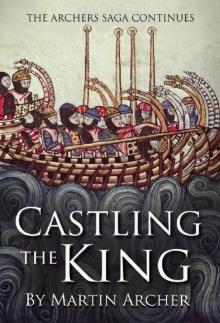 Castling The King
Castling The King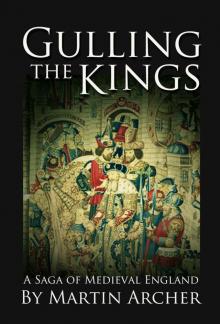 Gulling The Kings
Gulling The Kings Israel's Next War
Israel's Next War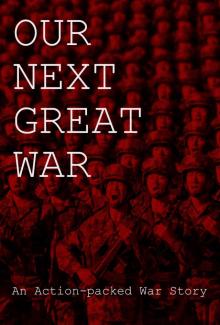 Our Next Great War
Our Next Great War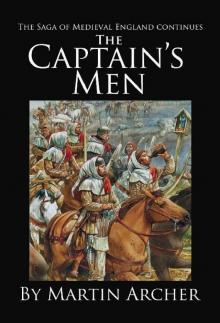 The Captain's Men
The Captain's Men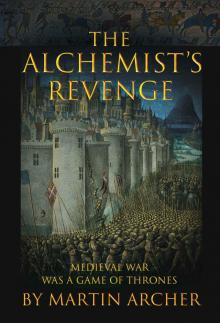 The Alchemist's Revenge
The Alchemist's Revenge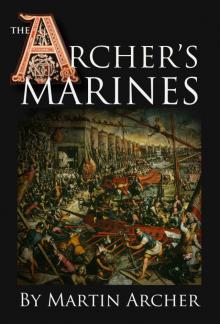 The Archer's Marines: The First Marines - Medieval fiction action story about Marines, naval warfare, and knights after King Richard's crusade in Syria, ... times (The Company of Archers Book 5)
The Archer's Marines: The First Marines - Medieval fiction action story about Marines, naval warfare, and knights after King Richard's crusade in Syria, ... times (The Company of Archers Book 5)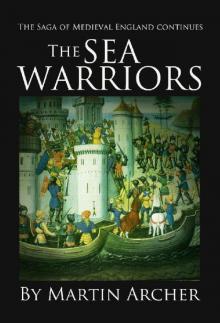 Sea Warriors
Sea Warriors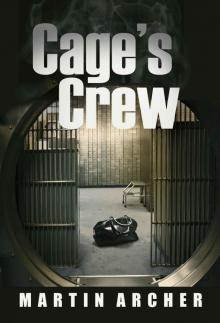 Cage's Crew
Cage's Crew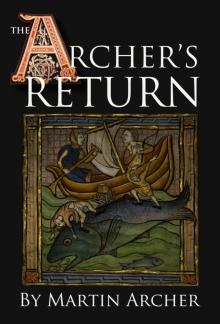 The Archer's Return: Medieval story in feudal times about knights, Templars, crusaders, Marines, and naval warfare during the Middle Ages in England in the reign of King Richard the lionhearted
The Archer's Return: Medieval story in feudal times about knights, Templars, crusaders, Marines, and naval warfare during the Middle Ages in England in the reign of King Richard the lionhearted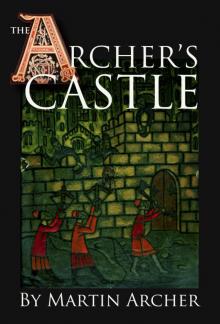 The Archer's Castle: Exciting medieval novel and historical fiction about an English archer, knights templar, and the crusades during the middle ages in England in feudal times before Thomas Cromwell
The Archer's Castle: Exciting medieval novel and historical fiction about an English archer, knights templar, and the crusades during the middle ages in England in feudal times before Thomas Cromwell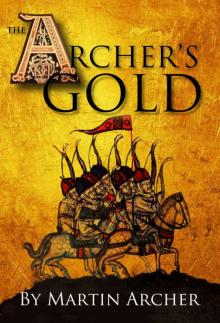 The Archer's Gold: Medieval Military fiction: A Novel about Wars, Knights, Pirates, and Crusaders in The Years of the Feudal Middle Ages of William Marshall ... (The Company of English Archers Book 7)
The Archer's Gold: Medieval Military fiction: A Novel about Wars, Knights, Pirates, and Crusaders in The Years of the Feudal Middle Ages of William Marshall ... (The Company of English Archers Book 7)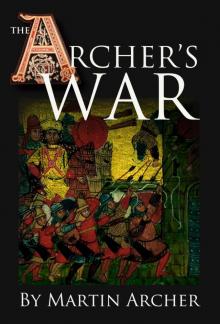 The Archer's War: Exciting good read - adventure fiction about fighting and combat during medieval times in feudal England with archers, longbows, knights, ... (The Company of English Archers Book 4)
The Archer's War: Exciting good read - adventure fiction about fighting and combat during medieval times in feudal England with archers, longbows, knights, ... (The Company of English Archers Book 4)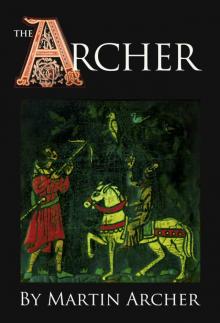 The Archer: Historical Fiction: exciting novel about Marines and Naval Warfare of medieval England set in feudal times with knights,Templars, and crusaders during Richard the lionhearted's reign
The Archer: Historical Fiction: exciting novel about Marines and Naval Warfare of medieval England set in feudal times with knights,Templars, and crusaders during Richard the lionhearted's reign